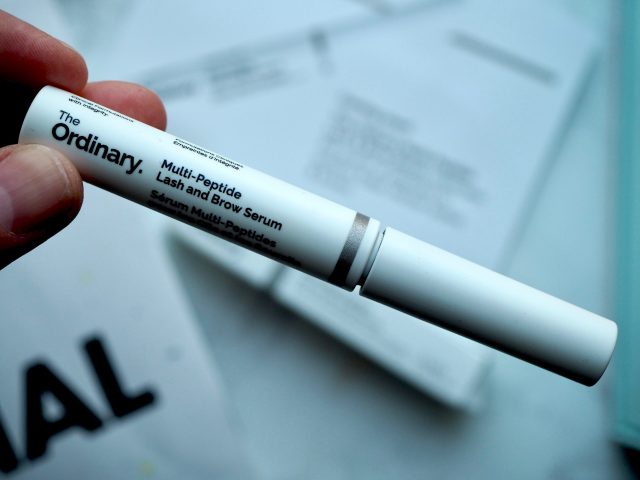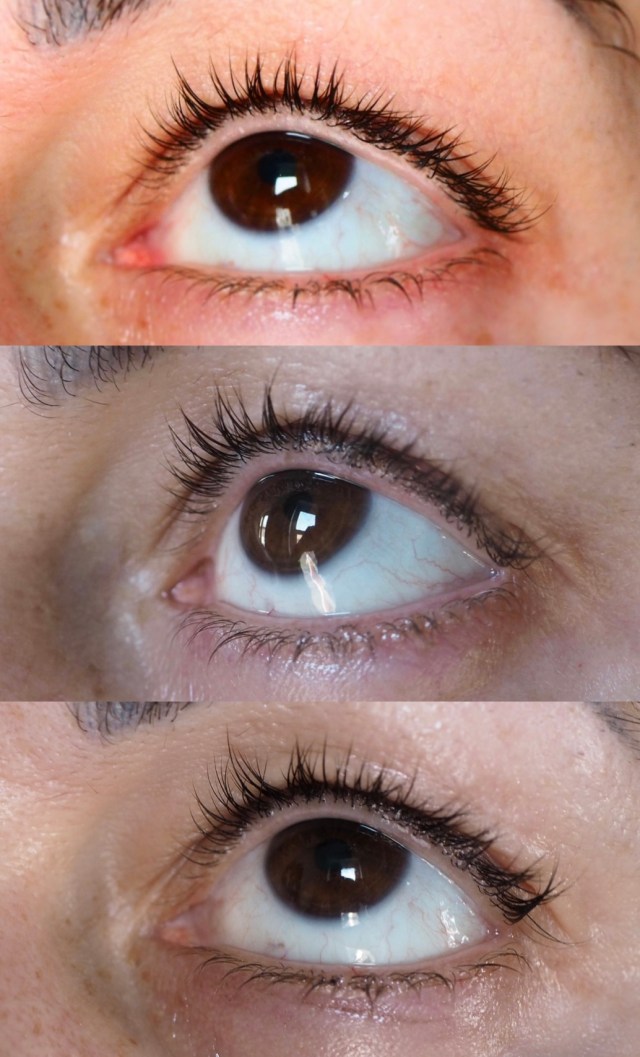
Does The Ordinary Multi-Peptide Lash and Brow Serum Work?
The Ordinary Multi Peptide Lash and Brow Growth Serum with Before and After Pictures
I was fortunate to receive The Ordinary Multi Peptide Lash and Brow Serum in advance of it’s release to give a few weeks trial to see if it really works and give it an accurate review. I started using the serum well over a month ago, according to The Ordinary’s site, you could see results as early as 4 weeks, so we should get and idea if it really works. I’ve used Bimatoprost (which is a prescription strength lash formula, the one which can change your eye colour) before and didn’t notice any results until 6 weeks. I’ll keep updating the post as I use the serum with more pics.
Here are some facts about The Ordinary Lash Serum
- “A volumising brow and lash serum for a thicker, fuller and healthier look”, note that it doesn’t say lengthening
- A light non greasy formula utilising 11 active ingredients, four peptide complexes and natural extracts
- To be used twice daily to nourish and protect, enhance the look of density
- First effects seen at around 4 weeks
- pH 7.30-7.40, alcohol, oil, silicone, nut, gluten free, cruelty free (leaping bunny approved), vegan
- The technologies present in this formula include SYMPEPTIDE XLASH® complex (with Myristoyl Pentapeptide-17), Anargy® complex (with Oligopeptide-2 and Glycoproteins), Widelash™ complex (with Biotinoyl Tripeptide-1 and Panthenol), REDENSYL™ complex (with Larix Europaea Wood Extract, Camellia Sinensis Leaf Extract, and Zinc Chloride), CAPIXYL™ complex (with Acetyl Tetrapeptide-3 and Trifolium Pratense Flower Extract), and High-Solubility Caffeine.
- £12.40 for 5ml (make sure you buy from an approved seller, fake The Ordinary products abound)
The Ordinary Lash Serum Active Ingredients- Do They Work?
Lets have a look at the ingredient list-
Aqua, Glycerin, Butylene Glycol, Myristoyl Pentapeptide-17, Biotinoyl Tripeptide-1, Oligopeptide-2, Acetyl Tetrapeptide-3, Caffeine, Panthenol, Arginine, Glycine, Glycoproteins, Larix Europaea Wood Extract, Trifolium Pratense Flower Extract, Camellia Sinensis Leaf Extract, Dextran, Maltodextrin, Zinc Chloride, Hydroxyethylcellulose, Xanthan Gum, Trisodium Ethylenediamine Disuccinate, Polysorbate 20, Sodium Metabisulfite, Caprylyl Glycol, 1,2-Hexanediol, Sodium Benzoate, Benzoic Acid, Ethylhexylglycerin, Phenoxyethanol, Chlorphenesin.
Ingredients list
Taking a look at these ingredients, it looks like there are some different sorts of actives-
- We have peptides- Myristoyl Pentapeptide-17, Biotinoyl Tripeptide-1, Oligopeptide-2, Acetyl Tetrapeptide-3, which basically give chemical messages to the cells to modify the way they work;
- There are also amino acids- Arginine, Glycine that give the cells what they need to produce the lash and brow hairs;
- Also Vitamins
- Natural extracts
- And other miscellaneous lash conditioners.
I want to have a look to see if there is any scientific evidence behind any of these ingredients
- Myristoyl Pentapeptide-17– Meant to increase keratin (aka hair) production and increase the life cycle of a cell. There is very little scientific research on this peptide. This study (Sachdev et al, 2020) tested out a growth serum with Myristoyl Pentapeptide-17 as an ingredient and it only had 30 participants.
- Biotinoyl Tripeptide-1– Again, no real scientific research. This peptide delivers Biotin to the hair follicles.
- Oligopeptide-2– Also known as Insulin Like Growth Factor. This has way more research as a treatment for hair loss and as a hair growth stimulator. This study (Su et al, 1999) has some information about how it works. It increases the life of a hair follicle, meaning that the hair follicle is in it’s growth phase for longer. Evidence for Oligopeptide-2’s effects are mainly in vitro, which means it’s hair stimulating effects have only been seen in the lab and haven’t been replicated in real life. But there is some evidence, so that’s good.
- Acetyl Tetrapeptide-3– Paired with red clover extract (seen as Trillium Europaea Flower in the ingredient list). According to the in vivo studies by the company that makes Acetyl Tetrapeptide-3 (called Capixyl), it increases the strength of the extracellular matrix and reduces inflammation making the hair stronger and healthier.
- Caffeine– There have been a number of studies that show that caffeine can help increase hair growth (Visconti et al, 2020). There have been some tests on real life people and the results look promising.
- Panthenol– A B Vitamin (B5), which is a really common ingredient in hair care products (it’s where Pantene gets it’s name), it nourishes hair and skin alike, increases moisture and health.
- Arginine, Glycine, Glycoproteins– No evidence at all for these as hair growth stimulators, but amino acids and glycoproteins are building blocks for proteins and cells respectively. In theory they should help nourish the brows and lashes and give the cells what they need.
- Larix Europaea Wood Extract– Accord to a random website Larch tree extract can effectively activate hair follicle stem cells, helps strengthen hair, improve the appearance and the brightness and healthier. No actual scientific research.
- Trifolium Pratense Flower Extract– Red clover extract, as we mentioned above, is paired with Acetyl Tetrapeptide-3
- Camellia Sinensis Leaf Extract– Green tea extract, which has lots of beneficial ingredients including anti oxidants, anti carcinogens and polyphenols including EGCG aka epigallocatechin-3-gallate. EGCG may stimulate hair growth (Kwon et al, 2007)
- Zinc Chloride– Zinc is a necessary element for hair growth, Zinc Chloride is also an antimicrobial.
What is The Ordinary Lash and Brow Serum Like?
It comes in a tube with a little applicator brush. It has the classic The Ordinary plain black and white design.

The brush is quite stiff and short. It’s a good design for this product because the stiffness of the brush makes it easier to work into the lashes. I haven’t been using it on my brows, my brows are already full and I don’t want to waste product where it’s not needed. The serum is a gel liquid and it’s pretty easy to apply. I have accidentally poked it into my eye a couple of times and it does sting a bit, but it’s very easy to avoid doing that. I’ve been using it for a few weeks and there seems to be plenty of product left. It’s a bit tricky to tell how much is left.
Does The Ordinary Multi-Peptide Lash and Brow Serum Work?
I have photos comparing day 1 to day 34 and day 52, I think I can see some lengthening and some thickening of my lashes. I think my lashes are curlier too. There are so many hair growth supportive ingredients in this serum, I think if thin lashes or brows are concern to you, this product is definitely worth a try. If your eyelashes take a beating for any reason, The Ordinary Lash and Brow Serum should help bring them back to life. You have to be persistent, any hair growth treatment will take many weeks to have a visible effect, a month is not long enough to see any kind of result.
Have a look at my 4 week results, I can definitely see visible improvement in my lashes.

I took the top photo on the 10th May, the second on the 14th June and the third on the 30th June. I think my lashes look a little thicker, darker and maybe a little longer. What do you think? I haven’t tried the serum on my brows, I have full brows to begin with. I’d rather concentrate my efforts on my lashes. I’m going to keep using it and as the months go by, I’ll keep updating, so keep following. I’m on Instagram and TikTok as NiaPattenLooks and SkincarewithFriends, which is my skincare podcast.
To try The Ordinary Multi-Peptide Lash and Brow Serum Review yourself head to The Ordinary. To get more inspiration to make your TO purchase, check out my handy product suggestion questionnaire.
References
Kwon, O. S., Han, J. H., Yoo, H. G., Chung, J. H., Cho, K. H., Eun, H. C., & Kim, K. H. (2007). Human hair growth enhancement in vitro by green tea epigallocatechin-3-gallate (EGCG). Phytomedicine, 14(7-8), 551-555.
Sachdev, M., Velugotla, K., Revanker, S., & Somasekhar, G. (2020). An Open-label, Single-center, Safety and Efficacy Study of Eyelash Polygrowth Factor Serum. The Journal of clinical and aesthetic dermatology, 13(2), 61–66.
Su, H. Y., Hickford, J. G., Palmer, B. R., & Bickerstaffe, R. (1999). Insulin-like growth factor 1 and hair growth. Dermatology online journal, 5(2).
Visconti, M. J., Haidari, W., & Feldman, S. R. (2020). Therapeutic use of caffeine in dermatology: A literature review. Journal of Dermatology and Dermatologic Surgery, 24(1), 18.